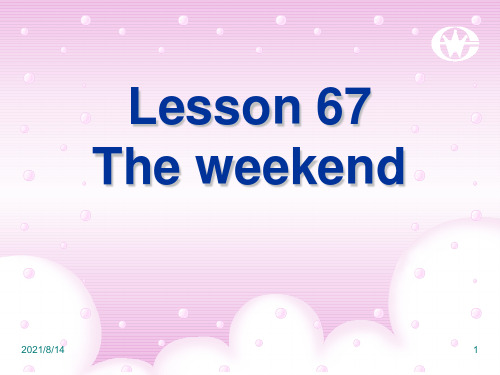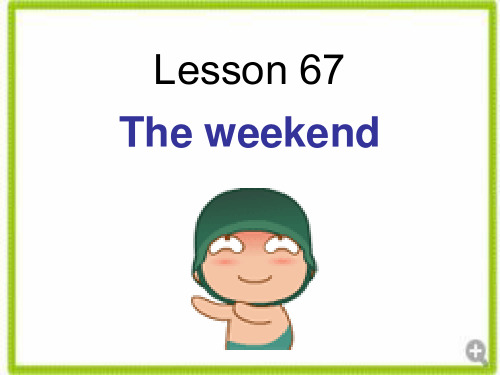新概念英语第一册 第67课NCE1 lesson67 Gavin
新概念第一册67课ppt课件

New words
• absent adj. 缺席的; • be absent from work 旷工 • be absent from school 旷课
采用PP管及配件:根据给水设计图配 置好PP管及配 件,用 管件在 管材垂 直角切 断管材 ,边剪 边旋转 ,以保 证切口 面的圆 度,保 持熔接 部位干 净无污 物
• 修改后:
• We are going to spend three days in the country.
采用PP管及配件:根据给水设计图配 置好PP管及配 件,用 管件在 管材垂 直角切 断管材 ,边剪 边旋转 ,以保 证切口 面的圆 度,保 持熔接 部位干 净无污 物
7
• We are going to say at my mother for the weekday.
1
• Was you at the butcher? • Yes, I were.
采用PP管及配件:根据给水设计图配 置好PP管及配 件,用 管件在 管材垂 直角切 断管材 ,边剪 边旋转 ,以保 证切口 面的圆 度,保 持熔接 部位干 净无污 物
1
• Was you at the butcher? • Yes, I were.
• 修改后: • Were you at the butcher's? • Yes, I was.
采用PP管及配件:根据给水设计图配 置好PP管及配 件,用 管件在 管材垂 直角切 断管材 ,边剪 边旋转 ,以保 证切口 面的圆 度,保 持熔接 部位干 净无污 物
2
• Was you on the butcher's, too? • No, he weren't.
新概念第一册第67课

am/is-was, go-went, eat-ate, buy-bought, think-thought teach-taught, hurt-hurt, win-won,
is-was, are-were,
do-did
swim-swam,
bring-brought,
16
时态复习
一般现在时: (lesson 47,55,57) Father usually goes to work in the
morning. Father does not usually go to work in the
morning. Does father usually go to work in the
Lucy was at the office on Tuesday. Was Lucy at the office on Tuesday?
28
29
30
31
一般过去时的否定
主谓宾结构: 主语+did not/ didn’t+ 谓语+宾语 We didn’t cook this morning. He didn’t cook this morning. 对比一下: 一般现在时的否定: We don’t cook in the morning. He doesn’t cook in the morning.
33
33
一般过去时的否定
主系表结构: They were in the garden on Sunday. They were not in the garden on Sunday.
He was absent from school on Monday. He was not absent from school on
新概念英语第一册第67-68课课件

反身代词 myself himself herself itself ourselves
themselves yourselves
2021/8/14
2
Discussion
What did you do on weekend ?
The weekend
go shopping
shopping list
2021/8/14
4
❖ greengrocer ❖ absent ❖ Monday ❖ Tuesday ❖ Wednesday ❖ Thursday ❖ keep ❖ spend ❖ weekend ❖ Friday ❖ Saturday ❖ Sunday ❖ country ❖ lucky
2021/8/14
❖ ② n. 乡下,乡村 ❖ the country = the countryside 乡下 ❖ country表示“农村”时,前面一定要加定冠词the。 ❖ ③ adj. 乡下的;乡村风味的
I prefer country life to life in the city. 乡村生活与城市生活相比,我更喜欢乡村生活。
◆afford 人作主语,支付得起,腾出时间 I can’t afford it.
eg: I want to have a picnic with some of my friends, but they can’t afford some time for me. ◆take [花时间] It takes sb. some time to do sth. eg:It took me 3 hours to explain this plan.
单词学习
n. 蔬菜水果零售商 adj. 缺席的 n. 星期一 n. 星期二 n. 星期三 n. 星期四 v. (身体健康)处于(状况) v. 度过 n. 周末 n. 星期五 n. 星期六 n. 星期日 n. 乡村 adj. 幸运的
新概念英语67课讲义

新概念英语67课讲义-CAL-FENGHAI.-(YICAI)-Company One1Lesson 67 the weekend 周末一、单词与短语greengrocer: n.蔬菜水果零售商;absent:adj.缺席的,重要短语:be absent from:缺席、、、、He was absent from school last week.上周他没上学。
keep: v.(身体健康)处于(状况),保持、、、keep doing sth:一直做、、、或者是不停地做、、、、;keep knocking the door:一直敲门;spend:v.度过;spend a weekend:度周末;weekend:v.周末;country:n.国家;乡村;lucky: adj.幸运的;luck:n.幸运,机遇。
Monday:n,星期一;Tuesday:n.星期二;Wednesday:n.星期三;Thursday:n.星期四;Friday: n.星期五;Saturday: n.星期六;Sunday: n.星期日;在星期几前边一般加介词on,如:on Monday:在周一;On Sunday:在周日;二、短语、句型与语法1、Were you at the butcher′s?刚才您在肉店里吗?Yes, I was. 是的,我在。
在本句中,需要注意的一个知识点:在英文表示某一种商店的短语中,shop这个词往往可以省略,如文中的the butcher′s 其实就是the butcher′s shop的省略,另外像文中的the greengrocer′s 其实就是 the greengrocer′s shop 的省略,另外的例子还有the hairdresser′s (shop )等等,shop 的省略不影响句义,就是一种表达的习惯。
2、how is jimmy today?吉米今天怎么样?在本句中我们继续复习关于询问人或事物状况的几个重要的句型:How is/are+主语、、、怎么样?例:How are you today你今天可好How is Tom today汤姆今天可好另外What is the matter with、、、经常用来询问人和事物的状况,常作“是否有问题”“是否有麻烦讲”例如:What is the matter with Tom?汤姆怎么了啊?What is the matter with this bike?这辆自行车怎么了啊?What is the matter with the book?这本书怎么了?3、Was he absent from school last week?上周他没上学吧?在本句中需要掌握一个重点短语的用法:be absent from:缺席、、、例:He is absent from the meeting since he is ill.他今天缺席会议是因为他病了。
新概念英语第一册lesson67

②You were n't happy this morning.
③He wasn't a teacher six years ago.
一般过去时的句型构成形式:
一、含有系动词(be动词——am/is/are)的一般过去时形式:
✿肯定句:主语 + was (were) + …。
e.g. ① I was late yesterday. I am late. ②You were happy this morning. You are happy. ③He was a teacher six years ago. He is a teacher.
♣ MRS.JOHNSON: Hello.
Were you at the butcher's? ✲ were是be动词are的过去式 ✲ 在肉店
★ MRS.WILLIAMS: Yes. I was.
✲ was是be动词
am的过去式
Were you at the butcher's, too?
♣ MRS.JOHNSON: No, I wasn't.
在蔬菜水果零售店
♣ MRS.JOHNSON: Was he absent from school last week?
✲ be (动词) absent from: 缺席 (1)You were absent from school yesterday. (2)She was absent from the meeting.
The weekend 周末
Listen to the tape then answer
this question:
What are the Johnsons going to do at the weekend?
新概念英语第一册Lesson67

• Mrs.Johnson:Very well,thank you. We are going to spend three days in the country. We are going to stay at my mother’s for the weekend.
• Mrs.Williams:Friday,Saturday and Sunday in the country! Aren’t you lucky!
(乡下)
★ absent adj. 缺席的
[ˈæ bsənt]
be absent from
不在,缺席
be absent from school
缺课
be absent from work
旷工
She doesn’t like school, so she is often absent from school.
她不喜欢上学,所以她经常缺课。
3.How are you all keeping?
• 你们身体都好吗?
• 问人怎么样也可以说: • How are you doing? • How is everything/it going? • What’s going on?
• Mrs.Williams:He’s very well,thank you.
Monday Tuesday Wednesday Thursday Friday Saturday Sunday
n. 星期一 n. 星期二 n. 星期三 n. 星期四 n. 星期五 n. 星期六 n. 星期日
I am going to stay at my mother's this Friday.
3.Who was at the butcher’s?
新概念英语NCE1_lesson67-68(共24页)课件

Wednesday ,and thurday. from
• We are going to spent three days on the
country. spend
in
• Aren’t you luck!
lucky
Monday Tuesday Wednesday Thursday Friday Saturday Sunday
• We are going to stay at my mother’s for the weekend.
• Mrs.Williams:Friday,Saturday and Sunday in the country! Aren’t you lucky!
Find out the mistakes
• Was you at the butcher’s?
were
• Yes,I were. was
• How are Jimmy today? is
• Was he absent to school last week? from
• How are you all keep? keeping
• He was absent in Monday,Tuesday,
主格 I he she it we they you
宾格 me him her it us them you
…的 my
his her its our their your
新概念英语第一册第67课课件NCE1Lesson67(共47页)

绕口令游戏 • 3. I scream, you scream, we all scream for ice-cream! • 我叫喊,你叫喊,我们都喊着要冰 淇淋!
绕口令游戏
• 4. Betty beat a bit of butter to make a better butter. 贝蒂敲打一小块黄油要做一 块更好的奶油面。
• Spend v.度过 • Spend+n./pron度过
翻译
• We are gonging to spend several days at my mother’s. • I want to spend my holiday in the country this weekend.
• I hope that you wouldn’t spend so much time watching television.
Part one
• Something like apples, bananas, pears….
Part one
• We eat it in summer, it make us cool down
Part one
• The place with lots of water
Part one
Part three
• Can you count? • 猜数字游戏
Part four
• 绕口令游戏
绕口令游戏
• 1. Can you can a can as a canner can can a can? 你 能够像罐头工人一样装罐头 吗?
绕口令游戏
• 2. I wish to wish the wish you wish to wish, but if you wish the wish the witch wishes, I won't wish the wish you wish to wish. • 我希望梦想着你梦想中的梦想,但是如果 你梦想着女巫的梦想,我就不想梦想着你 梦想中的梦想。
新概念英语第一册第67课

She talked in the library.
2
She didn’t talk in the library.
3
Did she talk in the library?
4
Yes,she did. No,she didn't.
5
What did she do?
6
He made a noise.
yesterday,tomorrow,last,
next,this,that等限定词来修饰morning/afternoon/evening/spring/winter等词时,前面不加任何介词
yesterday,tomorrow,today,tonight单独使用时,前面不能加任何介词
规则变化的动词过去式
greengrocer n. 蔬菜水果零售商
be absent from…… 不在……,缺席…… be absent from school 缺课 be absent from work 旷工 她不喜欢上学,所以她经常缺课。 She doesn’t like school, so she is often absent from school.
一般过去时练习 我给医生打电话了。
He called the doctor.
He didn’t call the doctor.
Did he call the doctor?
Yes, he did. No, he didn't.
What did he do?
3
2
1
4
5
一般过去时练习
*
我们在图书馆说话了。
星期六, 7月7日 Saturday, July 7th 星期一, 9月9日 Monday, September 9th 周日, 8月8日 Sunday, August 8th 星期二, 10月10日 Tuesday, October 10th.
新概念英语第一册第67课演示教学

规则变化的动词过去式
1 直接加ed:
work—worked look—looked 2 以不发音e结尾的单词,直接加d:
live —lived use—used, 3 以辅音字母+y结尾的,变y为i加ed:
No, 主语+didn’t.
• 他今天早上做饭了。(肯、否、疑、答、特) • He cooked this morning. • He didn’t cook this morning. • He did not cook this morning. • Did he cook this morning? • Yes, he did. No, he didn't. • What did he do this morning?
15 15
一般过去时的否定
They were in the garden on Sunday. They were not in the garden on Sunday. He was absent from school on Monday. He was not absent from school on Monday.
13
一般过去时的否定
主语+did not/ didn’t+ 谓语+宾语 We didn’t cook this morning. He didn’t cook this morning. 对比一下: 一般现在时的否定: We don’t cook in the morning. He doesn’t cook in the morning.
11
新概念英语第一册第67课

一般过去时
• 一般过去时(simple past tense)表示过去 某个时间里发生的动作或存在的状态,常 和表示过去的时间状语连用,如yesterday, last night,in 1990,two days ago等。 • 一般过去时也表示过去经常或反复发生的 动作,常和often,always等表式频率的时 间状语连用。
一般现在时
一般过去时
is , am are
→ →
was were
一般过去时结构
含有be动词(过去的状态)
肯:主语+was/were +其他. 否:主语+wasn’t/weren’t +其他. 疑:Was/Were +主语+ 其他? 答:Yes,主语+was/were. No, 主语+wasn’t / weren’t.
absent adj. 缺席的
• • • • • be absent from 上星期她没去上学吧? Was she absent from school? 我昨天没上班。 I was absent from work yesterday.
keep
v.
身体处于…状态,保持
• How are you all keeping? • How is your mother keeping? • Please keep the door open.
规则变化的动词过去式
1 直接加ed: work—worked look—looked 2 以不发音e结尾的单词,直接加d: live —lived use—used, 3 以辅音字母+y结尾的,变y为i加ed: study— studied carry—carried 4以元音字母+y结尾的,直接加ed: enjoy —enjoyed play—played 5 以重读闭音节结尾的,双写+ed: stop— stopped plan—planned
- 1、下载文档前请自行甄别文档内容的完整性,平台不提供额外的编辑、内容补充、找答案等附加服务。
- 2、"仅部分预览"的文档,不可在线预览部分如存在完整性等问题,可反馈申请退款(可完整预览的文档不适用该条件!)。
- 3、如文档侵犯您的权益,请联系客服反馈,我们会尽快为您处理(人工客服工作时间:9:00-18:30)。
absent
/ˈ æ bsənt/ adj. 缺席的
反义词: present [ˈ preznt] adj. 出席的 All of the students will be present at the meeting. 全体学生将出席会议。
Gavin交流YY群:9293585
单词讲解
Lesson 67
约翰逊夫人:您好。刚才您在肉店里 吗? 威廉斯夫人:是的,我在肉店里。 您也在肉店里吗? 约翰逊夫人:不, 我不是。 我在蔬菜水果店里。
Lesson 67
Gavin交流YY群:9293585
课文讲解
Lesson 67
本课语法:一般过去时态(be动词的过去式变化) 一、含义
在英语中,非现在的以前都叫过去。 过去发生的而现在已经结束的动作要用一般过去时态。 一般过去时表示过去某个时间里发生的动作或状态或过去习惯性、 经常性的动作行为。
Gavin交流YY群:9293585
课文讲解
Lesson 67 The weekend 周末 A: Hello. Were you at the butcher's? B: Yes. I was. Were you at the butcher's, too? A: No, I wasn't. I was at the greengrocer's.
Gavin交流YY群:9293585
课文讲解
Lesson 67
三、用法 一般过去时常表示在 过去某一个特定的时间发生的动作或 存在的状态,此时常和表示过去的特定的时间状语连用。 这些时间状语有:yesterday, yesterday evening, last night, last year, last summer等。 句子转换成现在时的对比: Were you at the butcher's? —— Are you at the butcher's? Yes, I was. —— Yes, I am. No, I wasn't. —— No, I'm not. 要记得第一、第三人称单数都用was;其他情况则用were.
经典英语从 新概念一册 开始学起
Instructor: Gavin 课程通知交流YY群: 9293585
Lesson67 The weekend 周末
Lesson 67
MRS JOHNSON: Hello. Were you at the butcher's? MRS WILLIAMS: Yes. I was. Were you at the butcher’s ,too? MRS JOHNSON: No, I wasn’t. I was at the greengrocer ’s. How’s Jimmy today? MRS WILLIAMS: He’s very well, thank you. MRS JOHNSON: Was he absent from school last week? MRS WILLIAMS: Yes, he was. He was absent on Monday, Tuesday, Wednesday and Thursday. How are you all keeping? MRS JOHNSON: Very well, thank you. We’re going to spend three days in the country. We’re going to stay at my mother’s for the weekend. MRS WILLIAMS: Friday, Saturday and Sunday in the country! Aren’t you lucky!
Gavin交流YY群:9293585
单词讲解
be absent from… 缺席…,不参加… be absent from school 缺课 be absent from work 矿工
例如:Mary is absent from the party. 玛丽没有参加这个聚会 。
Lesson 67
Gavin交流YY群:9293585
单词讲解
Lesson 67
country
/ˈ kʌntri/ n. 乡村
【1】乡村 country life 乡村生活 乡村音乐 My grandparents live in the country. 我的祖父母在乡下。 We spend a good day in the country.
二、形式构成
一般现在时态 be动词 第一人称 am /are 第三人称 is 第二人称 are 一般过去时态 be动词 第一人称 was/ were 第三人称 was 第二人称 were 肯定句:主语+was/were+…… 否定句: 主语 + was not/ were not+… 一般疑问句:Was/Were+主语+……? 答语:肯定回答:Yes, 主语+was/were. 否定回答:No, 主语+wasn’t/weren’t.
Gavin交流YY群:9293585
New Words & Pronunciations 生词及其发音
Lesson 67
n. 星期一 mʌndeɪ ; Monday /ˈ ˈ mʌndi/ tjuːzdeɪ ; ˈ tjuːzdi/ n. 星期二 Tuesday /ˈ wenzdeɪ ; n. 星期三 Wednesday /ˈ ˈ wenzdi/ n. 星期四 θɜːzdeɪ ; ˈ θɜːzd/ Thursday /ˈ fraɪdeɪ ; ˈ fraɪdi/ n. 星期五 Friday /ˈ sæ tədeɪ ; ˈ sæ tədi/ n. 星期六 Saturday /ˈ sʌndeɪ ; ˈ sʌndi/ n. 星期日 Sunday /ˈ
单词讲解
“花费时间、金钱”的词汇辨析:
Lesson 67
cost → 指花费时间、金钱、劳力等。其主语是物,而不能由 人充当,也不用被动形式。 This book costs me ten dollars. 这本书花了我十美元。 take → 普通用词,指需要占用空间、时间或精力等,其主语 可以是it,也可以是一件事情。 It takes them three years to build this road. 他们用了三年时间 修这条路。 Repairing this car takes him the whole afternoon. 他花了一下午 修车。 spend → 主语必须是人 I spend two hours on this question. 这道题花了我两个小时。 They spend two years (in) building this bridge. 造这座桥花了他 们两年时间。
Gavin交流YY群:9293585
New Words & Pronunciations 生词及其发音
Lesson 67
bʊtʃə(r)/ n. 屠夫;屠户 butcher /ˈ ɡriːnɡrəʊsə(r)/n. 蔬菜水果零售商 greengrocer /ˈ æ bsənt/ adj. 缺席的 absent /ˈ /kiːp/ v. (身体健康)处于(状况) keep spend /spend/ v. 度过 kʌntri/ n. 乡村 country /ˈ lʌki/ adj. 幸运的 lucky /ˈ
spend time (in)doing sth 花费时间做某事
Tom spends two hours in doing his homework. Students should spend much time studying English. 学生需要花许多时间学习英语。
Gavin交流YY群:9293585
You are a lucky dog.幸运儿
Good luck! 祝你好运!
Gavin交流YY群:9293585
单词讲解
Lesson 67
n. 星期一 mʌndeɪ ; Monday /ˈ ˈ mʌndi/ tjuːzdeɪ ; ˈ tjuːzdi/ n. 星期二 Tuesday /ˈ wenzdeɪ ; n. 星期三 Wednesday /ˈ ˈ wenzdi/ n. 星期四 θɜːzdeɪ ; ˈ θɜːzd/ Thursday /ˈ fraɪdeɪ ; ˈ fraɪdi/ n. 星期五 Friday /ˈ sæ tədeɪ ; ˈ sæ tədi/ n. 星期六 Saturday /ˈ sʌndeɪ ; ˈ sʌndi/ n. 星期日 Sunday /ˈ The office is closed at the weekend. The shop is open from 9 a.m. to 6 p.m. on weekdays.
at the greengrocer’s (shop) 在蔬菜水果店
Gavin交流YY群:9293585
单词讲解
Lesson 67
在英文中,表示店铺、住宅、公共机构、公共建筑物以及教 堂等的名字或某人家时,名词所有格后常不出现它所修饰的 名词。如: the doctor’s (office) 医务室 表示在上述这些具体的地址,介 the baker’s (shop) 面包店 词用at the hairdresser’s (shop) 理发店 at+比较具体的地址/时间 the stationer’s (shop) 文具店 my mother’s (house) 我妈妈家 —Where is your mother? 你妈妈在哪里? —She is at the greengrocer’s. 她在水果蔬菜零售店。
【2】国家 European countries 欧洲国家 France is a very beautiful country. 法国是一个非常漂亮的国家。
